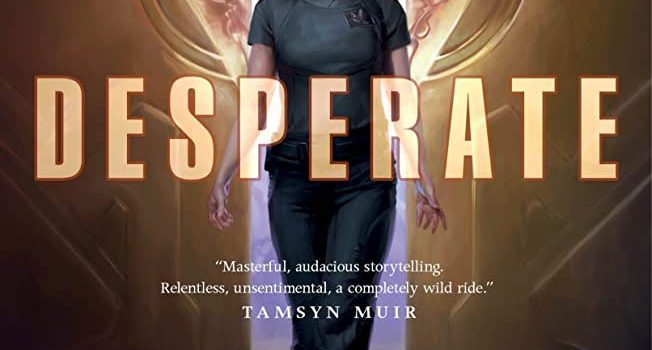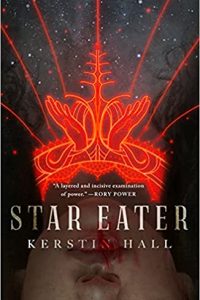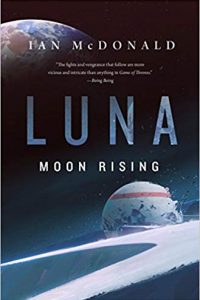Alexandra Pierce Reviews Some Desperate Glory by Emily Tesh
 Some Desperate Glory, Emily Tesh (Tordotcom 978-1-25083-498-0, $26.09, 448pp, hc) April 2023. Cover by Christine Foltzer.
Some Desperate Glory, Emily Tesh (Tordotcom 978-1-25083-498-0, $26.09, 448pp, hc) April 2023. Cover by Christine Foltzer.
Getting through the first few chapters of this debut novel required trust. I haven’t read Emily Tesh’s Greenhollow duology (2019 and 2020), so I had no sense of what her work is like. I have read a lot of Tordotcom’s publications, though, so I had to hope that there was more to the story than initially met my eye. You see, the first few chapters were both oddly familiar and creepy. The familiarity came from an opening setup like many military SF stories: humanity striving against aliens and impossible odds, doing what’s right for the species, individuals subsumed to the military cause (and the ‘‘population targets’’; at which no one who’s read Joanna Russ’s We Who Are About To can help but shudder). The creepiness is in reading this in 2023, from a woman, and from a publishing house that I know for its progressive work. It took a leap of faith to keep going.
It did eventually become clear Tesh has crafted an outstanding novel for her debut precisely in subverting all those tropes that troubled me. Indeed, early as it is in 2023, I’ll say it’s likely to be one of the debut novels of the year.
Valkyr – Kyr to most people – has grown up on Gaea, the last noncollaborating outpost of humanity left after the destruction of Earth. She’s a warbreed, genetically enhanced, and constant drills, plus seeing every other person as competition, have made her very, very good at fighting. Her entire life revolves around the expectation that she will assigned to a combat unit so that she can strike a blow against the majo – all the alien species who contributed to the destruction of Earth, and its 14 billion inhabitants. The only person she really has time for is her brother, Magnus, since her older sister Ursa turned traitor and left Gaea many years ago. Eventually Kyr is compelled to leave Gaea on a mission of her own devising – taking humanity’s revenge on the aliens into her own hands, after feeling betrayed by Gaea’s hierarchy. And that’s when everything starts to unravel.
There is a long list of content warnings that precede the opening of Some Desperate Glory, particularly around the attitudes and language of some of the characters (they gave me heart that there was more going on than initial impressions suggested, although other readers may find them off-putting; it’s a more hopeful book than the warnings may suggest). One of the warnings is around radicalization, Kyr and the entire cohort of Gaea having been radicalized by the adults in charge. Once Kyr has left Gaea, she begins a slow and painful deradicalization – which requires, in the first place, a recognition that such a thing is necessary, itself a deeply troubling experience. She is aided in this partly by new people – an alien held captive on Gaea, and a friend of her brother who really doesn’t fit Gaean expectations – but also by finally seeing more clearly the people who have always been around her, especially Magnus.
Kyr is rarely likeable, especially in the first half of the novel. She is driven and ambitious and passionate – all qualities that can be turned to good or evil, and her circumstances on Gaea mean that those qualities were turned early on towards a single goal: revenge on aliens, whom she does not see as people. She is an unpleasant messmate, singularly focused on making the rest of her mess into appropriate Gaean citizens; she is as emotionally ignorant as it is possible to be, and entirely lacking in self-awareness beyond her fighting abilities. She is exactly what Gaea has trained her to be. Tesh’s ability to present all of that and still make Kyr a compelling character – to make her development and gradual change make sense within her context – are testament to her remarkable talent. The rest of the cast, while important, rather pale in comparison to the monumental journey Kyr is on, emotionally and intellectually.
Tesh presents no easy answers to the issues she raises. The Earth really was destroyed, because the Wisdom deemed that it was necessary to do so for the greatest good. The Wisdom, something like an AI with the ability to shape and change reality, was built thousands of years ago by the majo. This is what Kyr is ultimately confronted by: both the Wisdom itself, and also its reasons for acting. Is it appropriate to sacrifice one for the many – in this case, a truly galactic-scale version of the trolley problem: one planet for how many others?
This is a spectacular space opera. It’s bold, imaginative, occasionally grim, and ultimately hopeful that individuals can change, and can make a difference. It’s not a light read – with themes like genocide and racism, that would be hard – but it’s rewarding, and I suspect will reward a second and third reading.
Alexandra Pierce reads, writes, podcasts, cooks and knits; she’s Australian and a feminist. She was a host of the Hugo Award winning podcast Galactic Suburbia for a decade; her new podcast is all about indie bookshops and is called Paper Defiance. Alex has edited two award-winning non-fiction anthologies, Letters to Tiptree and Luminscent Threads: Connections to Octavia E Butler. She reviews a wide range of books at www.randomalex.net.
This review and more like it in the March 2023 issue of Locus.
 While you are here, please take a moment to support Locus with a one-time or recurring donation. We rely on reader donations to keep the magazine and site going, and would like to keep the site paywall free, but WE NEED YOUR FINANCIAL SUPPORT to continue quality coverage of the science fiction and fantasy field.
While you are here, please take a moment to support Locus with a one-time or recurring donation. We rely on reader donations to keep the magazine and site going, and would like to keep the site paywall free, but WE NEED YOUR FINANCIAL SUPPORT to continue quality coverage of the science fiction and fantasy field.
©Locus Magazine. Copyrighted material may not be republished without permission of LSFF.






